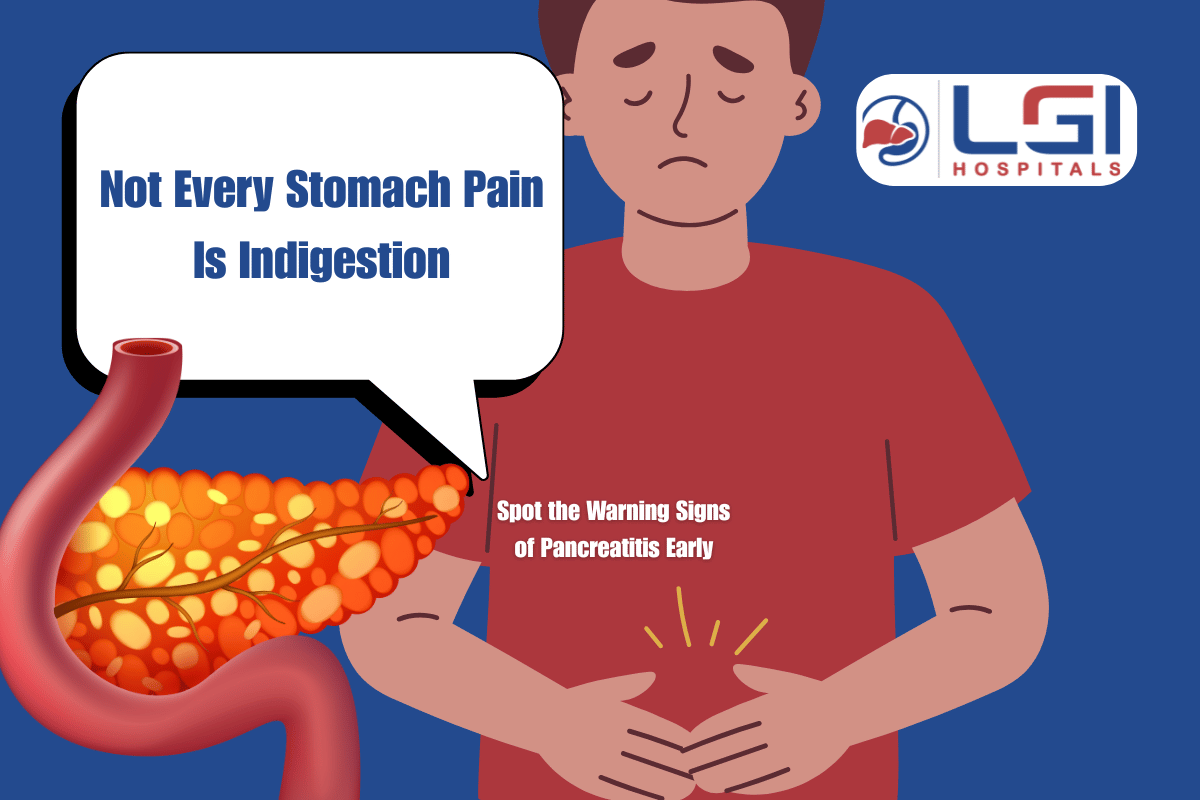When you experience sudden or severe pain in your upper abdomen, it’s easy to dismiss it as indigestion. However, if the pain persists or intensifies, it could be a sign of something much more serious, pancreatitis, an inflammation of the pancreas that requires timely pancreatitis treatment to prevent complications. Knowing the difference between simple indigestion and pancreatitis can help you take quick action and protect your health.
In this article, experts from LGI Hospitals explain how to recognize the warning signs, when to seek medical care, and what effective treatment for pancreatitis looks like.
Understanding Pancreatitis
The pancreas is a vital organ located behind the stomach that helps with digestion and regulates blood sugar. When it becomes inflamed, the condition is called pancreatitis. This inflammation may occur suddenly (acute pancreatitis) or develop gradually over time (chronic pancreatitis).
Both forms can be dangerous if not treated early. That’s why identifying the symptoms and getting prompt pancreatitis treatment is crucial for recovery.
Indigestion vs. Pancreatitis: Knowing the Difference
Indigestion is usually mild and short-lived, often triggered by overeating, spicy food, or stress. It may cause bloating or discomfort but typically goes away with rest or medication.
Pancreatitis, however, causes severe and persistent pain that can radiate to your back or chest. The discomfort often worsens after meals and does not improve with over-the-counter remedies.
Here’s a simple comparison to help you distinguish between the two:
| Symptom | Indigestion | Pancreatitis |
| Pain level | Mild and temporary | Severe, constant pain |
| Location | Upper abdomen | Upper abdomen radiating to the back |
| Duration | 1–2 hours | Several hours or days |
| Triggers | Spicy or heavy food | Alcohol, gallstones, infection |
| Other signs | Bloating or gas | Vomiting, fever, rapid pulse, nausea |
If your abdominal pain is severe, long-lasting, or accompanied by vomiting or fever, it may be pancreatitis and needs immediate medical attention.
When to Seek Medical Care Immediately
You should not delay medical consultation if you experience:
- Intense abdominal pain that doesn’t ease
- Pain spreading to your back or chest
- Vomiting, nausea, or loss of appetite
- Fever or rapid heartbeat
- Yellowing of the skin or eyes (jaundice)
Delaying pancreatitis treatment can cause complications like infection, kidney failure, or severe inflammation of surrounding organs.
At LGI Hospitals, our experts use advanced imaging and enzyme tests for quick diagnosis and initiate evidence-based treatment to ensure faster recovery.
Comprehensive Pancreatitis Treatment at LGI Hospitals
The team at LGI Hospitals offers a multi-disciplinary approach to pancreatitis treatment, focusing on accurate diagnosis, relief from symptoms, and long-term pancreas health.
1. Diagnosis and Assessment
Specialists determine whether the condition is acute or chronic using blood tests and imaging scans.
2. Medical Management
Treatment includes intravenous fluids, pain management, and antibiotics if necessary.
3. Nutritional Therapy
Patients receive personalized diet plans to ease stress on the pancreas and promote healing.
4. Advanced Procedures
In complicated cases, minimally invasive techniques such as endoscopic drainage or gallstone removal may be performed.
Each patient receives individualized care designed for optimal recovery and prevention of recurrence.
How to Prevent Future Episodes
After successful pancreatitis treatment, making certain lifestyle changes can lower the risk of recurrence:
- Avoid alcohol and smoking completely
- Follow a balanced, low-fat diet
- Stay hydrated and eat smaller, frequent meals
- Manage gallstones or cholesterol problems early
- Schedule regular follow-up checkups
The Bottom Line
Persistent or severe abdominal pain should never be ignored. What feels like simple indigestion might be the early sign of pancreatitis. Early diagnosis and timely pancreatitis treatment are key to a safe and complete recovery.
At LGI Hospitals, our experienced Pancreas Care Experts provide advanced diagnostic facilities and personalized treatment plans — ensuring every patient receives compassionate and effective care.

